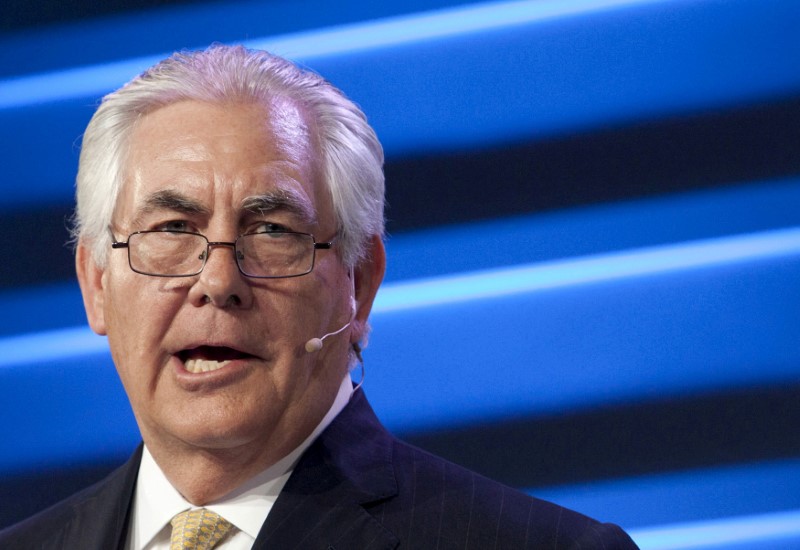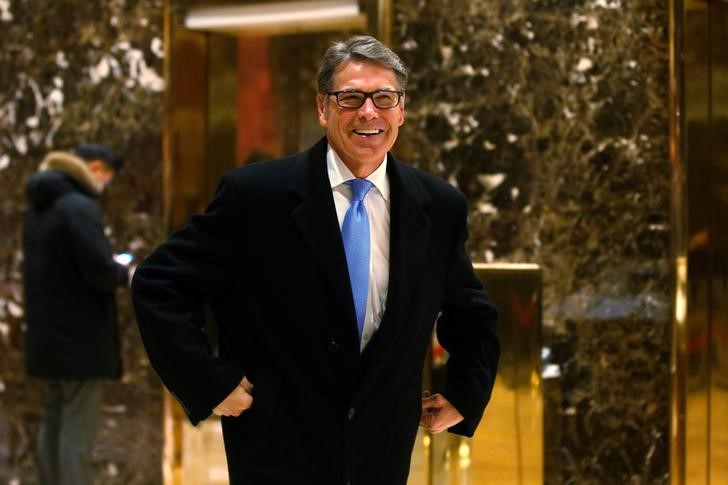Oilmen take Washington, signal dawn of new U.S. energy era

Ever since the Supreme Court broke up John D. Rockefeller’s Standard Oil in 1911, the energy industry has been at loggerheads with the federal government. Now it is the government — or may be if ExxonMobil Chief Executive Officer Rex Tillerson is confirmed as President-elect Donald Trump’s secretary of state.
All across the oil patch, they’re figuratively uncorking the champagne bottles as Tillerson and other well-placed leaders and friends are proposed for top jobs. Rick Perry, former governor of oil-rich Texas, has been picked to run the Energy Department, which he once famously threatened to do away with and whose name he forgot in a 2012 Republican presidential primary debate. Scott Pruitt, a friend to Oklahoma’s homegrown shale industry and confirmed climate-change skeptic, would take over the Environmental Protection Agency. And Rep. Ryan Zinke, R-Montana, and former CEO of an oil and gas consulting firm, is poised to become head of the Interior Department.
“Oil and gas is really the future engine of the economy,” said Hess Corp. CEO John Hess. He lauded Trump’s picks and added that he has “made it very clear that energy is critical.”
[Tillerson visited White House often over Russia sanctions]
It’s a breathtaking turn of events for an industry that has battled the federal government for decades on tax issues, antitrust challenges, environmental regulations and ethics oversight under the Foreign Corrupt Practices Act. Now, after eight years of especially antagonistic face-offs with the Obama administration, Big Oil is going from Washington outsider to running the show.
“It’s clearly a U-turn from the current administration, which is very hostile to fossil fuels,” said Craig Pirrong, director of the University of Houston’s Gutierrez Energy Management Institute. With “a representative of the world’s largest energy company in the State Department, it’s inevitable that they’ll have a powerful and forceful and informed advocate.”
The industry is poised to wield previously unimaginable influence on a global scale in a Trump administration. Tillerson has legitimately honed his leadership skills as head of the largest publicly traded oil company in the world. He is equal parts diplomat and executive, having spent much of his career negotiating complex and controversial business transactions in countries with which the U.S. government has strained relations. In 2011, he famously went into business with Russian leader Vladimir Putin, signing a joint-venture agreement to partner with state oil company Rosneft on Arctic oil exploration.
“There is a very thin line between oil, geopolitics and diplomacy,” OPEC Secretary General Mohammad Barkindo said in Washington on Tuesday. Tillerson’s experience on that front makes him “more than qualified to occupy this very important office.”
But Tillerson’s oil-industry positions also could pose problems for implementing U.S. foreign policy. Tillerson has said he opposes international sanctions; as secretary of state he could push for easing sanctions against Russia, which would have obvious benefits for ExxonMobil’s partnership with Rosneft.
“Donald Trump doesn’t want to drain the swamp, he wants to drill in it,” said Sen. Ed Markey, D-Massachusetts. “These nominees’ ties to fossil fuel interests are as deep as an oil well.”
Tillerson, though, breaks with Trump’s climate-change denials. The oil executive has characterized global warming as “a serious risk” and supports a carbon tax as the best way to curb industry emissions, something Trump has said he opposes. Perry, meanwhile, oversaw a massive wind-power boom during his terms as Texas governor.
Like Tillerson’s, Perry’s business interests also could get a boost from his appointment. He sits on the board of Energy Transfer Partners, the company behind the beleaguered Dakota Access pipeline project stalled this year by President Barack Obama’s Army Corp of Engineers. Perry is broadly supportive of building out pipeline infrastructure. During his own short-lived presidential campaign, he promised to green-light TransCanada Corp.’s Keystone XL pipeline, which is also a priority for both Trump and Tillerson. As secretary of state, Tillerson would have direct authority over approving the project.
At the Interior Department, an agency that oversees drilling on public lands and in federal waters, the selection of Montana Republican Zinke bodes well for oil companies that have criticized federal barriers to energy development. The Interior Secretary will have an opportunity to open up new coastal areas for drilling, including Arctic and Atlantic waters that were blocked from exploration by the Obama administration. In Congress, Zinke has co-sponsored legislation to expand drilling and mining on public lands.
Pruitt, attorney general of Oklahoma, spent the last few years suing to block EPA rules energy companies oppose. As head of that agency, he’ll almost certainly begin working to dismantle them. In his home state, he created a “federalism unit” tasked with fighting “unwarranted regulation and overreach by the federal government” and has billed himself as the EPA’s chief antagonist.
The agency is one of two that could significantly affect the U.S. energy industry, according to Ed Morse, head of commodity research at Citigroup Inc. and a former deputy assistant secretary of state for international energy policy. The other is the Federal Energy Regulatory Commission, which approves natural-gas pipelines and LNG terminals.
These agencies “set how policy is implemented, so a lot can happen without changing law,” Morse said. Their actions could have “tangible results on both U.S. and global prices.”
With assistance from Mark Shenk and Jennifer A. Dlouhy.


